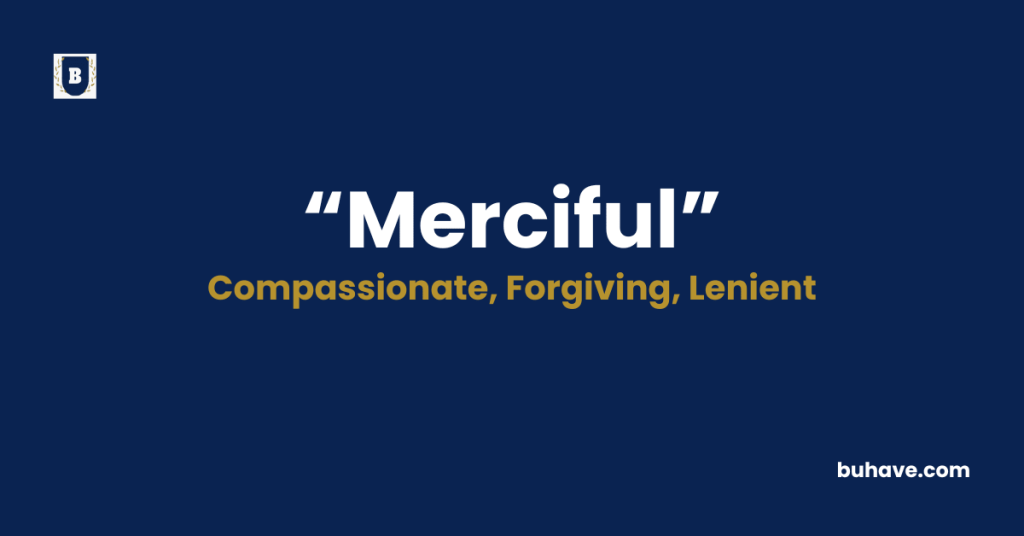The word ‘Merciful’ (Adjective) describes someone who chooses to be kind and forgiving, especially when they have the power to punish or hurt. Instead of seeking revenge or being harsh. in this guide, you’ll learn the full definition, synonyms, antonyms, etymology, and real-life examples of how to use ‘Merciful’ correctly in sentences.
Merciful Explained in Depth
A complete and detailed guide to the words Merciful including meaning, definition, examples, etymology, synonyms, and antonyms.
Meanings of Merciful
Merciful describes someone who chooses to be kind and forgiving, especially when they have the power to punish or hurt. Instead of seeking revenge or being harsh, a merciful person shows compassion and understanding. For example, when a teacher gives a struggling student another chance instead of a failing grade, they are being merciful.
Moreover, mercy often comes from a place of empathy. A merciful person tries to understand what others are going through, and as a result, they offer grace instead of judgment. In short, to be merciful means to treat others with kindness, even when you don’t have to.
Definition:
Merciful describes a person who shows kindness and forgiveness, especially when they have the power to be harsh or to punish. Instead of reacting with anger or judgment, a merciful person chooses to be gentle and understanding. For instance, when someone makes a mistake, a merciful person listens and helps rather than blaming or criticizing. In addition, mercy often comes from a deep sense of empathy. People who are merciful try to understand the struggles of others and respond with care.
As a result, their actions bring comfort and healing rather than fear or shame. So, in simple terms, being merciful means choosing compassion over cruelty and forgiveness over punishment—even when it’s not required.
Example Sentences:
- The judge chose to be merciful and gave the young man a second chance instead of sending him to jail.
- She offered a merciful smile and helped her friend up, even after he had spoken harshly to her.
- Because he understood how hard life had been for her, he made a merciful decision to forgive and move on.
- The teacher was merciful and allowed the student to retake the test after learning about the family emergency.
- Even though the team lost badly, the coach remained merciful and encouraged them to learn from their mistakes instead of criticizing them
Etymology:
The word “merciful” comes from the root word “mercy,” which originally came from the Old French word merci, meaning “pity” or “thanks.” That word, in turn, came from the Latin mercedem (later merces), which meant “reward,” “wages,” or “favor.” Over time, the idea of mercy shifted from meaning “a favor” to “kindness shown to someone who doesn’t deserve punishment.” Later, English speakers added the suffix “-ful,” which means “full of.” So, when you put it all together, “merciful” literally means “full of mercy”—or someone who shows compassion, kindness, and forgiveness, even when they don’t have to. In short, the word has traveled through centuries of meaning, but it has always centered around showing favor, kindness, or gentleness to others.
Merciful Synonyms:
- Compassionate
- Forgiving
- Lenient
- Clement
- Tenderhearted
- Understanding
- Sympathetic
- Gentle
- Charitable
- Tolerant
Merciful Antonyms:
- Cruel
- Unforgiving
- Harsh
- Severe
- Vengeful
- Mean
- Punitive
- Intolerant
- Vengeful
- Ruthless
FAQs about Merciful
Here are Frequently Asked Questions (FAQs) about the word “merciful”
1. What does “merciful” mean?
“Merciful” describes someone who chooses to be kind and forgiving, especially when they could be harsh or punish someone. A merciful person shows compassion and understanding, even when it isn’t required.
2. Is being merciful the same as being weak?
Not at all. In fact, it often takes strength to be merciful. It means you’re in control of your emotions and choose kindness over anger, even when it’s hard.
3. Can mercy be shown in everyday life?
Yes. You show mercy when you forgive a friend, give someone a second chance, or respond with patience instead of frustration.
4. Is “merciful” used more for people or for actions?
Both. You can describe a person as merciful, like a kind leader or parent, and you can also describe an action as merciful, such as a gentle response to a mistake.
5. What’s the difference between “merciful” and “forgiving”?
“Forgiving” focuses more on letting go of resentment, while “merciful” includes kindness and compassion, even beyond forgiveness—like helping or comforting someone who’s struggling.
6. Is “merciful” a religious word?
It can be, especially when describing the character of a higher power, like “a merciful God.” However, it’s also used in everyday language to describe kind and gentle behavior.
7. Can animals or nature be described as merciful?
Sometimes, people use “merciful” poetically in that way—like saying a peaceful passing was “merciful.” But generally, it’s a trait used for people and their actions.
Explore more M words:
- Positive words that start with M
- Negative words that start with M
- Adjectives words that start with M
- Nouns that start with M
- Verbs that start with M

















